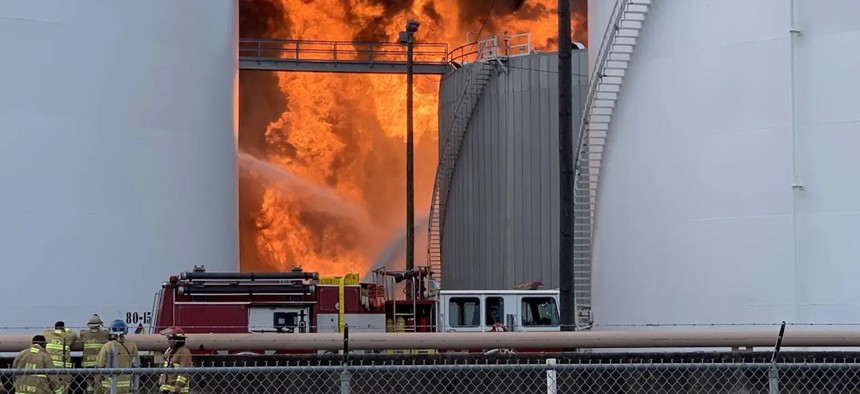
Firefighters struggle to extinguish the towering flames at ITC's tank farm in Deer Park on March 17, 2019. The final federal investigative report on the fire found multiple failures that contributed to the disaster. Courtesy of Environmental Protection Agency
Deer Park chemical fire in 2019 could have been prevented, federal investigation finds
The U.S. Chemical Safety and Hazard Investigation Board found that the ITC tank farm lacked crucial equipment to warn workers about the failure that led to the three-day fire.
"Deer Park chemical fire in 2019 could have been prevented, federal investigation finds" was first published by The Texas Tribune, a nonprofit, nonpartisan media organization that informs Texans — and engages with them — about public policy, politics, government and statewide issues.
A massive Houston-area chemical fire that burned for three days in 2019 could have been prevented if proper procedures were in place at the chemical storage facility run by the Intercontinental Terminals Co., according to an investigation released Thursday by the U.S. Chemical Safety and Hazard Investigation Board.
The report found that tank 80-8, where the fire began before it spread to nearby tanks containing dangerous chemicals, was not equipped with a flammable-gas detection system to warn personnel if something was wrong and was not equipped with emergency isolation valves designed to contain hazardous chemicals in the event that a system fails, a safety protocol recommended by regulators.
The board found that “because of gaps in relevant regulations,” some tanks weren’t subject to rules by the U.S. Occupational Safety and Health Administration and the U.S. Environmental Protection Agency, and ITC was not required to implement some of the safety rules that could have prevented the fire.
The CSB is recommending that the company implement additional safety measures, including installing sensors that can spot problems with pumps as well as gas detection systems that can sound an alarm when something goes wrong. The board, whose members are appointed by the president, does not issue citations or fines but makes safety recommendations to companies.
“This was a very large and disruptive event. The fire burned for three days, caused over 150 million dollars in property damage at the facility, put the surrounding community potentially at risk, and significantly impacted the environment,” CSB Chair Steve Owens said in a press release. “This disastrous event could have been prevented if proper safeguards had been in place at the facility.”
A recent investigation by The Texas Tribune and Public Health Watch revealed that for years before the 2019 fire, federal and state regulators documented repeated problems at ITC’s tank farm along the Houston Ship Channel, but the regulators did little to address the issues. The facility stores and distributes hazardous chemicals, gasses and petroleum products for the thousands of chemical plants and refineries lining the Ship Channel.
The fire spewed hazardous chemicals — including benzene, a known carcinogen — into the air, which led to several shelter-in-place advisories in Deer Park. Chemicals also flowed into the nearby Ship Channel, killing wildlife.
A spokesperson for ITC told the Tribune in a statement Thursday that the company “continues to assess the report and to work with all the regulatory agencies in connection with their review of the incident.”
The ITC facility housed more than 240 aboveground tanks. The fire began March 17, 2019, after a tank’s circulation pump failed and began to leak naphtha, a highly flammable liquid. Once the fire erupted, it spread to 14 other tanks — some big enough to hold 3.2 million gallons of chemicals. The tanks collapsed as a massive black plume of smoke spread over the Houston skyline.
Once the fire was out, the remaining chemicals in the collapsing tanks began venting into open air. The Tribune/Public Health Watch investigation found that benzene emissions reached dangerous levels in Deer Park weeks after the fire was extinguished, and officials at times didn’t immediately alert residents about the invisible danger.
The CSB’s investigation also found that elements of the chemical tank farm’s design — like the spacing between tanks or the location of controls for pumps and drainage systems — made it difficult for emergency responders to slow or prevent the spread of the fire.
ITC said it has already put in place many safety upgrades and others are underway, and noted that the company has “historically implemented and continues to implement” safety and emergency response protocols.
Join us for conversations that matter with newly announced speakers at the 2023 Texas Tribune Festival, in downtown Austin from Sept. 21-23.
This article originally appeared in The Texas Tribune at https://www.texastribune.org/2023/07/06/investigation-texas-chemical-plant-fire-itc-deer-park/.
The Texas Tribune is a member-supported, nonpartisan newsroom informing and engaging Texans on state politics and policy. Learn more at texastribune.org.






